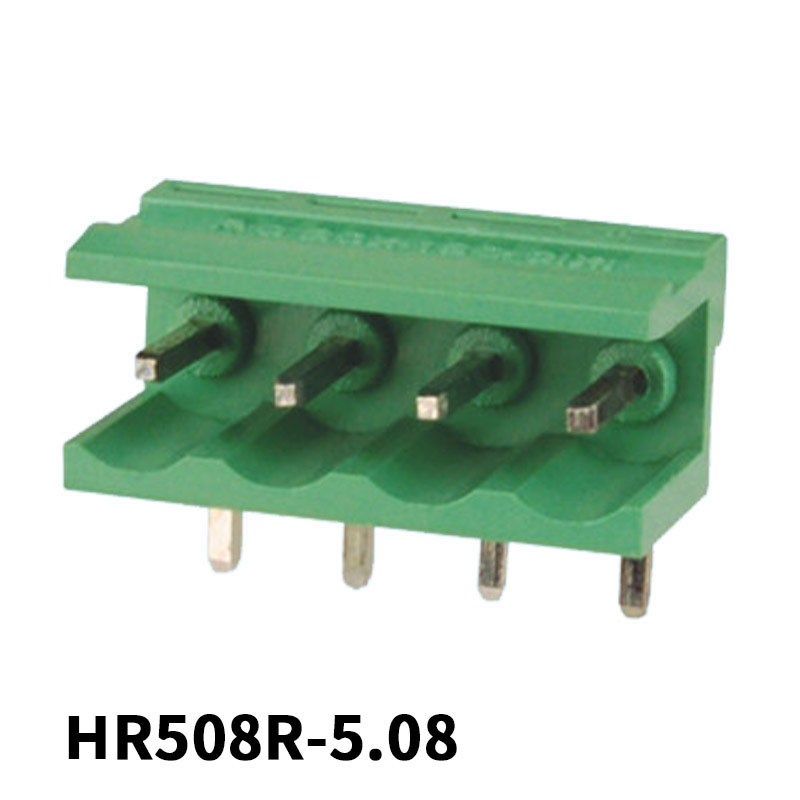There are three common methods for the classification of terminal blocks: according to the raw materials of the terminal, such as copper terminals; according to the function of the terminal, such as printed circuit board terminals; the last one is the more familiar classification by the market according to the connection form of the terminal , There are mainly the following categories.
1. Pluggable terminal blocks
It consists of two parts plug-in connection, one part presses the wire tightly, and then plugs it into the other part, which is soldered to the PCB board. The mechanical principle of this connection bottom and this anti-vibration design ensure the long-term airtight connection of the product and the reliability of the finished product. Mounting ears can be added at both ends of the socket. The mounting ears can protect the tabs to a large extent and prevent the tabs from being arranged poorly. At the same time, this socket design can ensure that the socket can be correctly inserted into the mother body. The socket can also have assembly buckle and lock buckle. The assembly buckle can be more firmly fixed to the PCB board, and the locking buckle can lock the mother body and the socket after the installation is completed. A variety of socket designs can be matched with different matrix insertion methods, such as horizontal, vertical, or inclined to the printed circuit board, etc., and different methods can be selected according to customer requirements. You can choose either metric wire gauge or standard wire gauge, which is currently the most popular terminal type on the market.
Plug-in terminal naming explanation
Example: NC 1.5/2-STF-3.50
NC: is the product number
1.5: The cross-sectional area of the product is 1.5mm
2: Refers to the number of terminal bits, the number of bits can be changed parameters
ST: refers to the plug
3.50: Refers to the parameter that the pitch is 3.50 can be changed
If: NC 1.5/2-STF-3.50 pluggable terminal block, only ST has become STF, which means that it has a screw flange on the side, in addition to the meaning of G and GF each represents a socket and a screw flange on the side .
2. Barrier terminal
It can realize safe, reliable and effective connection, especially in the use environment of high current and high voltage.

3. Spring type terminal
It is a new type of terminal using spring device, which has been widely used in the world's electrical and electronic engineering industries: lighting elevator lift control, instrumentation, power supply, chemical and automobile power, etc.
4. Track type terminal block
The use of crimping and unique thread self-locking design makes the wiring connection reliable and safe. The appearance design of this series of terminal blocks is beautiful and generous, and can be equipped with a variety of accessories, such as short-circuit strips, identification strips, baffles, etc.
5.H-type wall-through terminal
The screw connection technology is adopted, the insulation material is PA66 (flame retardant grade: UL94, V-0), and the connector is made of high-quality, highly conductive metal materials.
H-type through-wall terminal blocks can be installed side by side on panels of 1mm to 10mm thickness, and can automatically compensate and adjust the distance of panel thickness to form a terminal block with any number of poles, and can use isolation plates to increase air gap and creepage distance. The wall-through terminal can be firmly installed in the rectangular reserved hole on the panel without any tools, and the installation is extremely convenient.
H-type wall-through terminal blocks are widely used in some occasions that require wall-through solutions: power supplies, filters, electrical control cabinets and other electronic equipment. The insulation performance is good, the protection level is high, the user only needs to work directly after the external wiring, eliminating many unnecessary wiring steps.
The insulating material of WUK series terminal blocks is modified nylon (PA66), which has good electrical and mechanical properties. The screw is made of high-strength copper alloy, the conductor is made of electrolytic copper, and the wire frame is made of alloy copper that resists stress crack corrosion. The metal surface is also tinned or nickel plated for protection.
All copper terminals can avoid the battery effect of steel metal parts and copper wires in humid environments. There is a connection hole in the middle of the terminal, which can be connected in the center or with a side plug-in connector; it can be connected to electrical connection products with a 4mm2 conductor voltage of 800V and a current of 41A.